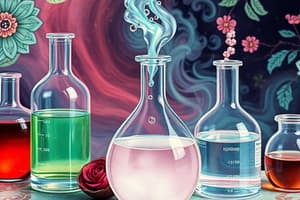Podcast
Questions and Answers
What defines the pH scale used to measure acidity and basicity?
What defines the pH scale used to measure acidity and basicity?
- Atomic number
- Electron configuration
- Proton donation (correct)
- Recurring patterns of chemical properties
Which type of chemical reaction involves the rearrangement of atoms within molecules and formation of bonds between different elements?
Which type of chemical reaction involves the rearrangement of atoms within molecules and formation of bonds between different elements?
- Single displacement reaction
- Double displacement reaction
- Decomposition reaction
- Combination reaction (correct)
What is the role of an acid in a chemical interaction?
What is the role of an acid in a chemical interaction?
- Donating a proton (correct)
- Forming new products
- Accepting a proton
- Rearranging atoms
What do the elements in the periodic table organize based on?
What do the elements in the periodic table organize based on?
Which compound is commonly known as hydrochloric acid?
Which compound is commonly known as hydrochloric acid?
In organic chemistry, what is the most common type of chemical reaction?
In organic chemistry, what is the most common type of chemical reaction?
Which statement best describes the formation of hydrogen chloride?
Which statement best describes the formation of hydrogen chloride?
Which compound is commonly used in water treatment, oil recovery, and food processing?
Which compound is commonly used in water treatment, oil recovery, and food processing?
What is the primary use of nitric acid in industrial applications?
What is the primary use of nitric acid in industrial applications?
How is sulfuric acid formed?
How is sulfuric acid formed?
Which type of compounds does organic chemistry primarily deal with?
Which type of compounds does organic chemistry primarily deal with?
What characterizes organic compounds in terms of their molecular structure?
What characterizes organic compounds in terms of their molecular structure?
Flashcards are hidden until you start studying
Study Notes
Chemistry is one of the fundamental sciences, which studies matter and its interactions with energy and other forms of matter. It plays a vital role in understanding the structure and behavior of all things around us. In this article, we will explore various aspects of chemistry, including chemical reactions, acids and bases, the periodic table, some common compounds like hydrogen chloride, ammonia, nitric acid, and sulfuric acid, and organic chemistry.
Chemical Reactions
A chemical reaction occurs when two or more substances interact to form new products. These interactions involve rearrangement of atoms within molecules and formation of bonds between different elements. Some common types of chemical reactions are combination, decomposition, single displacement, and double displacement reactions.
Acids and Bases
Acids and bases play a crucial role in chemistry, as they define the pH scale used to measure acidity and basicity. An acid is any substance that can donate a proton (hydrogen ion) to another compound. A base is any substance that can accept a proton from another compound. Examples of acids include acetic acid, sulfuric acid, and hydrochloric acid.
Periodic Table
The periodic table organizes chemical elements based on their atomic number, electron configuration, and recurring patterns of chemical properties. The elements are arranged into groups and periods. Groups contain elements with similar properties, while periods reflect the progressive addition of electrons to the outer shell of atoms. The periodic table provides insight into how different elements interact, forming compounds like hydrogen chloride, ammonia, nitric acid, and sulfuric acid.
Hydrogen Chloride
Hydrogen chloride is a compound formed when one atom of hydrogen reacts with one atom of chlorine. It is a strong acid that forms when hydrogen gas reacts with chlorine gas under certain conditions. In nature, this occurs through a process called chlorination. Hydrochloric acid is used in many applications, including water treatment, oil recovery, metal cleaning, food processing, and pharmaceuticals.
Ammonia
Ammonia is made from nitrogen and hydrogen gases reacting together in the presence of a catalyst. This reaction releases heat, making it an exothermic process. Ammonia can be used for various purposes, such as refrigerants, fertilizers, and pharmaceuticals.
Nitric Acid
Nitric acid is a type of inorganic acid derived from nitrogen. Its most common form is produced by adding nitrous oxides to hot air. Nitric acid has numerous uses, including in explosives, insecticides, herbicides, fungicides, and in the production of other chemicals.
Sulfuric Acid
Sulfuric acid is formed when sulfur dioxide combines with oxygen in the atmosphere, creating sulfur trioxide. This is then mixed with water vapor to produce sulfuric acid. Sulfuric acid is widely used in industry, particularly in the production of fertilizer, detergents, and petroleum products.
Organic Chemistry
Organic chemistry deals with carbon-containing molecules with carbon-carbon single bonds and often containing hydrogen atoms as well. These substances are characterized by the presence of C-H bond stretching vibrations within the molecular structure of aliphatic and aromatic compounds. Organic chemistry encompasses topics ranging from simple aliphatic compounds to complex macromolecules like proteins and nucleic acids.
In conclusion, chemistry plays a significant role in understanding the world around us. From chemical reactions to the organization of matter in the periodic table, each aspect contributes to our understanding of the natural world and its processes. Compounds like hydrogen chloride, ammonia, nitric acid, and sulfuric acid have specific properties that make them valuable in various industries, highlighting the practical applications of chemical principles. And the study of organic chemistry further expands our knowledge of carbon-containing compounds and their behavior.
Studying That Suits You
Use AI to generate personalized quizzes and flashcards to suit your learning preferences.




